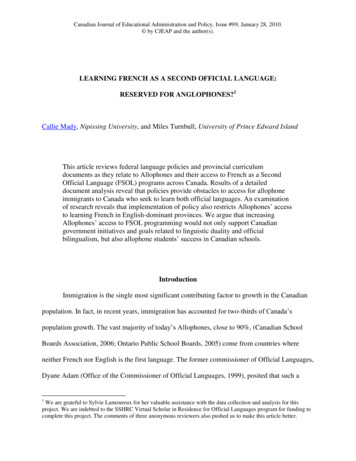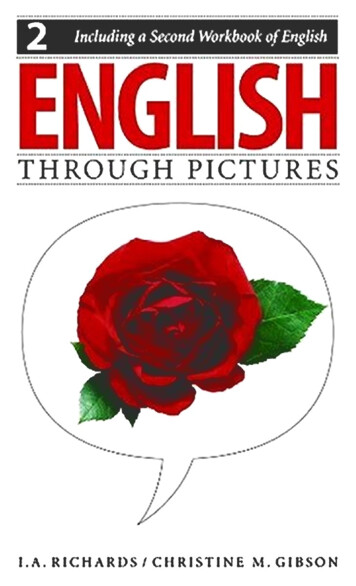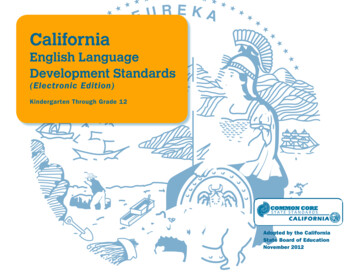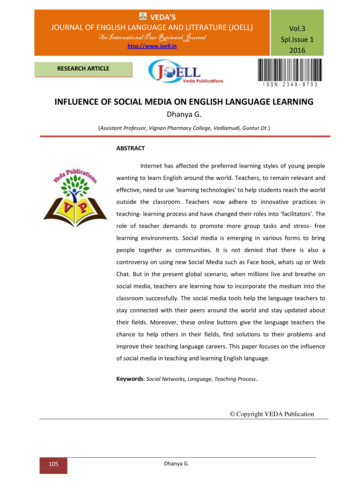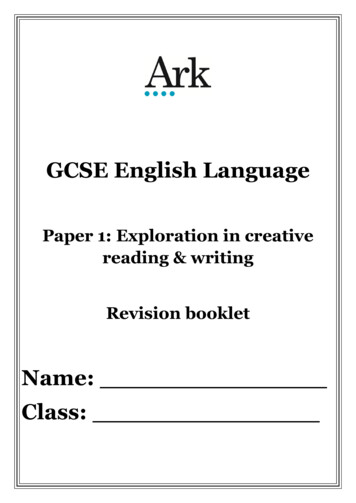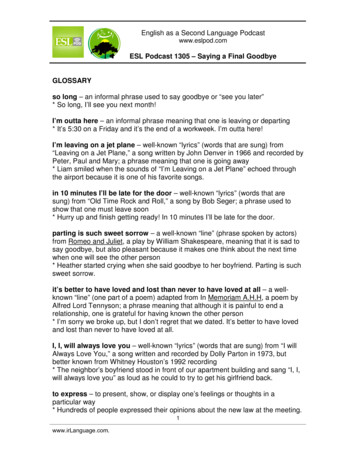
Transcription
English as a Second Language Podcastwww.eslpod.comESL Podcast 1305 – Saying a Final GoodbyeGLOSSARYso long – an informal phrase used to say goodbye or “see you later”* So long, I’ll see you next month!I’m outta here – an informal phrase meaning that one is leaving or departing* It’s 5:30 on a Friday and it’s the end of a workweek. I’m outta here!I’m leaving on a jet plane – well-known “lyrics” (words that are sung) from“Leaving on a Jet Plane,” a song written by John Denver in 1966 and recorded byPeter, Paul and Mary; a phrase meaning that one is going away* Liam smiled when the sounds of “I’m Leaving on a Jet Plane” echoed throughthe airport because it is one of his favorite songs.in 10 minutes I’ll be late for the door – well-known “lyrics” (words that aresung) from “Old Time Rock and Roll,” a song by Bob Seger; a phrase used toshow that one must leave soon* Hurry up and finish getting ready! In 10 minutes I’ll be late for the door.parting is such sweet sorrow – a well-known “line” (phrase spoken by actors)from Romeo and Juliet, a play by William Shakespeare, meaning that it is sad tosay goodbye, but also pleasant because it makes one think about the next timewhen one will see the other person* Heather started crying when she said goodbye to her boyfriend. Parting is suchsweet sorrow.it’s better to have loved and lost than never to have loved at all – a wellknown “line” (one part of a poem) adapted from In Memoriam A.H.H, a poem byAlfred Lord Tennyson; a phrase meaning that although it is painful to end arelationship, one is grateful for having known the other person* I’m sorry we broke up, but I don’t regret that we dated. It’s better to have lovedand lost than never to have loved at all.I, I, will always love you – well-known “lyrics” (words that are sung) from “I willAlways Love You,” a song written and recorded by Dolly Parton in 1973, butbetter known from Whitney Houston’s 1992 recording* The neighbor’s boyfriend stood in front of our apartment building and sang “I, I,will always love you” as loud as he could to try to get his girlfriend back.to express – to present, show, or display one’s feelings or thoughts in aparticular way* Hundreds of people expressed their opinions about the new law at the meeting.1www.irLanguage.com.
English as a Second Language Podcastwww.eslpod.comESL Podcast 1305 – Saying a Final Goodbyefond farewell – a sweet goodbye in which the people care about each other andspeak kindly to each other* Brent’s colleagues gave him a fond farewell on his last day in the office.optimism – hopefulness; a belief that good things will happen; positivity; withoutnegative thoughts* I appreciate your optimism, but I just don’t think this business plan can succeed.I’m blowing this pop stand – also “let’s blow this popsicle stand,” a phrasemeaning that one is leaving a boring, unexciting place* This movie is so boring. I’m blowing this pop stand!parting words – the words that one speaks when saying goodbye; the lastwords one says to another person* We couldn’t believe Mother’s parting words were, “Don’t forget to take out thegarbage.”sincere – showing one’s true emotions and feelings, without hiding anything andwithout deceiving or lying* Please except my sincere apology. It was my fault and I take full responsibility.may the force be with you – a well-known “line” (words spoken in a movie orplay) from the Star Wars movies, used to wish someone good luck so that he orshe will succeed* Good luck on your business trip. May the force be with you.Live long and prosper – a well-known “line” (words spoken in a movie or play)from the Star Trek TV series used to wish someone peace and success, usuallywith the hand raised in the air, with the “palm” (flat, open, front part of the hand)facing the other person, forming a V shape using the middle and ring fingers* Congratulations on your new job offer! Live long and prosper.a blast – a great time; a lot of fun and excitement* The new ride at the amusement park is a blast! You have to try it!a hoot – something that is funny, entertaining, and enjoyable* Carl is a hoot! He’s always telling jokes that make everyone laugh.toodle loo – a funny, informal way to say goodbye, taken from the Frenchphrase à tout à l'heure, meaning “see you soon”* Thanks for a fun day! Toodle loo!2www.irLanguage.com.
English as a Second Language Podcastwww.eslpod.comESL Podcast 1305 – Saying a Final GoodbyeCOMPREHENSION QUESTIONS1.a)b)c)Which of these is the most formal way to say goodbye?I’m outta here.Parting is such sweet sorrow.I’m blowing this pop stand!2.a)b)c)What does Lucy mean when she says, “It’s been a blast”?She has had a lot of fun.She will miss everyone a lot.She has known them for a very long time.WHAT ELSE DOES IT MEAN?to expressThe verb “to express,” in this podcast, means to present, show, or display one’sfeelings or thoughts in a particular way: “Why do so many people struggle toexpress their emotions?” In mathematics, the phrase “to express (something) in(units)” means to change the form of a quantity: “Please express your answer indegrees Fahrenheit – not Celsius.” An “express train/bus” is a very fast train orbus with few stops: “If you’re traveling by train from New York to Pennsylvania,make sure you take the express train so you don’t have to stop at every trainstation along the way.” Finally, the phrase “words cannot express” means thatone is not able to describe something fully: “Words cannot express how much Ilove my children.” [www.irLanguage.com]blastIn this podcast, the word “blast” means a great time with a lot of fun andexcitement: “The kids have a blast playing in the swimming pool on hot, sunnydays.” The word “blast” can also refer to the sudden movement of air or water:“The firemen opened the door, releasing a hot blast of air.” A “blast” can also bea loud noise caused by a horn or an explosion: “New York City is filled with theblast of car horns.” The phrase “at full blast” means for a device or machine to beturned on to the highest setting, especially to full volume, or as loudly aspossible: “Never listen to headphones at full blast as it might damage your ears.”Finally, a “blast” can be an explosion: “Two soldiers lost their legs in the bombblast.”3www.irLanguage.com.
English as a Second Language Podcastwww.eslpod.comESL Podcast 1305 – Saying a Final GoodbyeCULTURE NOTEFamous Rock Band Breakups and ReunionsMany famous “rock banks” (groups of musicians who perform rock-and-rollmusic” have “devoted” (with strong commitment and enthusiasm) “fans” (peoplewho like something very much) who “mourn” (feel very sad about a loss or death)their “breakups” (when a band breaks apart so that the members no longerperform together) and “celebrate” (are very happy about) their “reunions” (whenthe former members of a band perform together again after many years).Many bands break up because the musicians are “overworked” (have worked toohard) and too “stressed out” (with feelings of anxiety and worry). That is whathappened to The Eagles, a popular band in the 1970s. After years of “constant”(without stopping; without breaks) “recording” (making new music) and “touring”(traveling to many places to give concerts), the band members had “frayednerves” (a lot of anxiety) and had trouble “getting along” (maintaining friendlyrelationships). “Everything fell apart” (problems began) in July 1980 at a concertwhere one of the band members “insulted” (said something that hurt someone’sfeelings) a “Senator” (an elected representative in the government). Anotherband member became upset, they argued, and the band broke up. However, theperformers “reunited” (came back together again) in the 1990s and released new“albums” (collections of recorded music).Other bands have more “complex” (complicated; not clear, simple, orstraightforward) reasons for breaking up. Van Halen was a popular rock band inthe late 1970s, but the band is “widely known” (known by many people) for its“dramatic” (with a lot of emotion) breakup. The band “repeatedly” (many times)changed its singers and “bassists” (people who play the bass guitar) in a “series”(a group of events that happen over time) of “ugly” (not friendly or peaceful)breakups in which the members “cited” (referred to) different reasons for leaving.Comprehension Questions Correct Answers: 1 – b; 2 – a4www.irLanguage.com.
English as a Second Language Podcastwww.eslpod.comESL Podcast 1305 – Saying a Final GoodbyeCOMPLETE TRANSCRIPTWelcome to English as a Second Language Podcast number 1,305 – Saying aFinal Goodbye.This is English as a Second Language Podcast episode 1,305. I’m your host, Dr.Jeff McQuillan, coming to you from the Center for Educational Development inbeautiful Los Angeles, California.This episode is a dialogue between Lucy and me about saying goodbye. Let’sget started.[start of dialogue]Lucy: I don’t know how to say goodbye.Jeff: How about so long, I’m outta here, “I’m leaving on a jet plane” and “in 10minutes I’ll be late for the door”?Lucy: No, that’s not what I mean. I mean that it’s hard to say goodbye tosomething after such a long time. I’ve had a very happy time here.Jeff: What you really mean to say is, “Parting is such sweet sorrow.” But, “It’sbetter to have loved and lost than never to have loved at all.” “I, I, will always loveyou.”Lucy: Stop! Listen, what I want to express is a fond farewell and optimism for thefuture.Jeff: Ah, okay! Then you should say: Tomorrow is the first day of the rest of mylife! I’m off to bigger and better things! I’m blowing this pop stand!Lucy: No, no, no. That’s not right at all. I want to end with some meaningfulparting words, something sincere, something from my heart.Jeff: Like, “May the force be with you”?Lucy: Hmm . . . how about “Live long and prosper”?Jeff: Now are you ready to leave?Lucy: I guess so. It’s been a blast.5www.irLanguage.com.
English as a Second Language Podcastwww.eslpod.comESL Podcast 1305 – Saying a Final GoodbyeJeff: It’s been a hoot.Lucy: It’s been an honor and a pleasure.Jeff: Adiós.Lucy: Au revoir.Jeff: Sayonara.Lucy: Zàijiàn. Zoi gin.Jeff: Ciao.Lucy: Auf Wiedersehen.Jeff: Proshchay.Lucy: Tchau.Jeff: Wadaeaan.Lucy: Annyeong.Jeff: Toodle loo!Lucy & Jeff: Thank you and goodbye.[end of dialogue]Lucy begins our dialogue by saying, “I don’t know how to say goodbye.” I thengive her some suggestions, some informal expressions that we might use inEnglish to say goodbye. These are all informal, definitely not things that youwould say in normal conversation, in a formal setting. The first one, however, Iguess you could say in a formal or informal setting, and that is “so long.” “Solong” is one way of saying goodbye.Another much more informal way of saying goodbye is “I am outta here.” “I amoutta (outta) here” is something of an abbreviated way of saying, “I am out ofhere.” “To be out of here” is a way of saying “I’m leaving quickly,” often because Ino longer want to be here, though that isn’t always the case. If someone says,6www.irLanguage.com.
English as a Second Language Podcastwww.eslpod.comESL Podcast 1305 – Saying a Final Goodbye“I’m outta here,” he may be saying, “This is a bad situation and I no longer wantto be here.” Said in a different context, perhaps in a different way, it just meansgoodbye. If you are, for example, talking to a friend and you look at your clockand you realize you have to get home now, you say, “Well, I’m outta here. I gottaget home.” I have to return to my house.The next two expressions that I use are from songs, really, and they areexpressions of saying goodbye or of leaving from a couple of different popularsongs. One of them is “I’m leaving on a jet (jet) plane.” This comes from an oldsong called, appropriately enough, “I’m Leaving on a Jet Plane.” It was a songsung by the folk group back in the 1960s, Peter, Paul, and Mary.I’m leaving on a jet planedon’t know when I’ll be back againIt would be a very unusual way of saying goodbye, but it’s possible in a jokingway, especially if you are about to leave on a plane. A “jet plane” is really justanother word for an airplane here. “In 10 minutes I’ll be late for the door” isanother suggestion I give, and once again this comes from a popular song frommy youth, a song by the rock group Bob Seger and the Silver Bullet Band, who Iactually saw in concert when I was in high school. Yeah. I’m that old.The song was called “Old Time Rock and Roll” and was made famous in themovie that starred a young Tom Cruise called Risky Business. “In 10 minutes, I’llbe late for the door.” “To be late for the door” means that I will be out of the door– that is, I will be leaving. However, again, it’s not something that you wouldnormally say in order to say goodbye, but to someone of a certain age – my age– you might say it as a joke, knowing the other person would recognize it as aline from the song. The person would understand it means that you are sayinggoodbye.[www.irLanguage.com]Lucy says, however, “No, that’s not what I mean.” I was giving her expressionsused in situations when you are leaving temporarily – say, in the morning or afterwork. Lucy was referring to something more permanent. She says, “I mean thatit’s hard to say goodbye to something after such a long time.” She’s referring toperhaps leaving one’s job or saying goodbye to a certain situation such as writingdialogues, for example, for English lessons. “I’ve had a very happy time here,”she says.I respond by saying, “What you really mean to say is, ‘Parting is such sweetsorrow.’” “Parting is such sweet sorrow” is a well-known or famous line, phrase,spoken by one of the actors – one of the characters, I should say – in the7www.irLanguage.com.
English as a Second Language Podcastwww.eslpod.comESL Podcast 1305 – Saying a Final GoodbyeShakespeare play Romeo and Juliet. It’s used sometimes now, almost as a joke,to say that it is sad to say goodbye.The original line in the play means that saying goodbye is sad. That’s why it is a“sorrow” (sorrow). “Sorro
www.irLanguage.com. 1 GLOSSARY so long – an informal phrase used to say goodbye or “see you later” * So long, I’ll see you next month! I’m outta here – an informal phrase meaning that one is leaving or departing * It’s 5:30 on a Friday and it’s the end of a workweek. I’m outta here! I’m leaving on a jet plane – well-known “lyrics” (words that are sung) from “Leaving .



